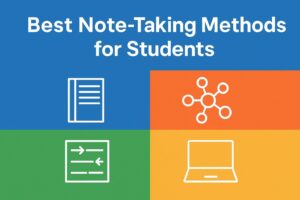Introduction
Why note-taking is important for learning and memory.
Common problem: students copy without understanding → low retention.
Promise: In this blog, you’ll discover proven note-taking methods that top students use worldwide.

Best note-taking methods for students in 2025
🔑 What Makes a Good Note-Taking Method?
Clarity → Easy to read & revise.
Structure → Highlights main points + key details.
Flexibility → Works across subjects (Maths, Science, History, etc.).
Efficiency → Saves time during revision.
🏆 1. Cornell Method
How it works: Divide page into 3 sections → Notes | Cues | Summary.
Best for: Class lectures, theoretical subjects like History/Pol. Science.
Pros: Organised, easy to revise.
Cons: Takes effort to maintain structure.
🏆 2. Mind Mapping
How it works: Start with a central idea → branch into keywords, diagrams, arrows.
Best for: Science, Geography, brainstorming, essay planning.
Pros: Visual memory boost, connects concepts.
Cons: Can get messy if over-detailed.
🏆 3. Flow Notes
How it works: Free-flow writing, doodles, arrows, connections → like a story.
Best for: Fast-paced lectures, subjects requiring connections (Economics, Philosophy).
Pros: Encourages active learning.
Cons: Difficult to review quickly if messy.
🏆 4. Charting Method
How it works: Divide page into columns → compare topics.
Best for: Dates/events (History), formulas (Maths/Physics), cause-effect (Pol. Science).
Pros: Easy comparison, quick review.
Cons: Not ideal for narrative subjects.
🏆 5. Outlining Method
How it works: Hierarchy → Headings → Subpoints → Details.
Best for: Subjects with structured notes (Biology, Civics, Literature).
Pros: Very organized, easy for revision.
Cons: Can be slow during fast lectures.
🏆 6. Digital Note-Taking (2025 Trend)
Tools: Notion, OneNote, Google Keep, Obsidian.
Best for: Students who prefer laptops/tablets.
Pros: Searchable, cloud storage, easy sharing.
Cons: Risk of distraction with devices.
⚡ Quick Comparison Table
| Method | Best For | Pros | Cons |
|---|---|---|---|
| Cornell | Lectures, theory | Organized, easy review | Needs practice |
| Mind Mapping | Visual subjects | Boosts memory | Can get messy |
| Flow Notes | Fast lectures | Encourages connections | Hard to revise quickly |
| Charting | Comparisons | Clear side-by-side view | Limited application |
| Outlining | Structured topics | Very systematic | Slow if lecture is fast |
| Digital Notes | Tech-savvy students | Searchable, shareable | Screen distraction |
📚 Tips to Choose the Right Method
For theory-heavy subjects → Cornell / Outlining.
For visual learning → Mind Maps / Charts.
For fast-paced classes → Flow Notes.
For students with devices → Digital apps.
✅ Conclusion
No single method works for all.
Experiment with 2–3, see what fits your learning style.
Consistency matters more than the method itself.
Perfect ✅ Adding FAQs + referral to your website will make the blog SEO-friendly, interactive, and professional.
Here’s the extended FAQ section + referral line you can directly paste at the end of your blog:
❓ Frequently Asked Questions (FAQs) on Note-Taking Methods
Q1. Which is the best note-taking method for students?
👉 There is no universal “best” method. For theory-heavy subjects, the Cornell Method works great. For visual learners, Mind Mapping is excellent. For quick lectures, Flow Notes are best.
Q2. Are digital notes better than handwritten notes?
👉 Both have pros and cons. Handwritten notes boost memory retention, while digital notes are searchable and easy to organize. Ideally, a hybrid approach works best.
Q3. How can I take notes faster during class?
👉 Use abbreviations, symbols, and short keywords instead of full sentences. The Flow Notes method or Outlining works well for speed.
Q4. Can note-taking improve exam scores?
👉 Yes ✅. Effective note-taking organizes your thoughts, saves revision time, and helps recall faster during exams. Students who make structured notes often score higher.
Q5. Which note-taking apps are best for students in 2025?
👉 Popular apps include Notion, OneNote, Obsidian, and Google Keep. If you want something simple, Evernote or Apple Notes also work well.
Q6. Is it okay to rely only on textbooks instead of making notes?
👉 Not recommended ❌. Textbooks contain too much information. Notes help you filter, summarize, and retain only what’s important for exams.
🌐 Want More Smart Study Tips?
👉 Check out more detailed guides, worksheets, and smart study hacks on my website: MindMakerAcademics.com